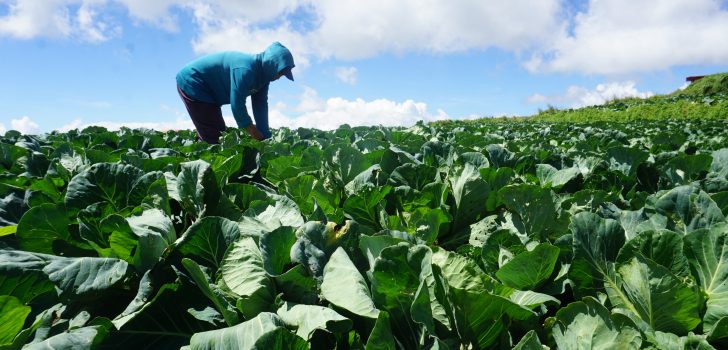
NPCO approves VCA for highland vegetables
The Department of Agriculture’s Philippine Rural Development Project (PRDP) through its National Project Coordination Office issued a No Objection Letter (NOL) to the Value Chain Analysis (VCA) for highland vegetables on August 30.
With the approval of the VCA, the provinces of Benguet and Mountain Province can now update their Commodity Investment Plans (CIPs) to include possible interventions for highland vegetables.
The VCA is crucial in the development of CIPs which serve as basis in identifying investments for the development of priority agricultural commodities under the PRDP.
Arnel Gagujas, Planning Officer of the PRDP Regional Project Coordination Office-Cordillera (RPCO-CAR) said that the VCA provides an analysis of the highland vegetable value chains in Benguet and Mountain Province.
“This analysis may provide a considerable guide in identifying specific areas for improving the highland vegetable value chains and in formulating an applicable and appropriate commodity investment plan in support to the highland vegetable industry in the region,” added Gagujas.
The commodities included in the VCA are cabbage, chinese cabbage, broccoli, carrots, cauliflower, garden pea/sweet pea, bell pepper, lettuce, and snap beans (pole).
According to Lorna Panyo, Business Development Officer of the PRDP RPCO-CAR, many farmer groups are still interested to submit enterprise subproject proposals in support to highland vegetables for PRDP funding despite the tedious documentary requirements and approval procedure.
“Since the region was hit by strong typhoons and continuous rain in these past months, some farmers associations and cooperatives especially in Benguet and Mt. Province are interested to submit proposals for possible funding under the PRDP,” she said.
Panyo added that farmer groups with completed/ongoing small livelihood projects/microenterprise subprojects, or those that were intended for typhoon-affected farmers, may also opt to expand their projects to small or medium enterprises to be able to request for more postharvest facilities and equipment.
A gist of the VCA for highland vegetables
The Cordillera region has a total agricultural land area of 285,194.61 hectares (ha) and more than 10 percent of its physical area is devoted to vegetable production. In terms of production volume, the region contributes about 84 percent for cabbage, white potato, and carrots as compared to the other regions. The highland municipalities of Benguet, Mt. Province, and Ifugao are the lead producers of semi-temperate or highland vegetables while the rest produces lowland vegetables.
The months of July to October are the most critical for Cordillera farmers since it is the months of typhoons and non-stop rains. Vegetables production areas are being damaged and landslides usually occur. In addition, frost comes during the months of December to February, which actually causes the low production of highland vegetables.
With this, farmers here, need to be updated on new farming technologies most especially related to climate resilience. Also, the VCA report says that there is a need to continually generate and disseminate new technologies especially to the far-off areas.
From the farm, highland vegetables are carefully loaded in trucks/jeepneys and even SUVs for transport to the trading posts/market areas in La Trinidad or Baguio where traders buy it depending on the existing market price. Others pack it at five to 10-kilogram capacity depending on the kind of vegetable. Truckloads of highland vegetables are also being transported to the market areas in Manila (Balintawak/Divisoria) daily and traders deliver these to assemblers/middlemen or directly to seaports going Visayas and Mindanao.
Meanwhile, the following gaps are identified in the highland vegetables VCA: unstable supply of vegetables; unstable quality due to non-observance of quality standards and inappropriate use of good production practices and postharvest technologies; and unstable market price.
Hence, the following needs to be considered to develop the highland vegetable industry in order to compete globally: Strengthen price policies; upgrade facilities including postharvest and processing facilities; continuous capacitating farmers on new farming technologies, improve and upgrade farm-to-market roads; strengthen policies and farmer cooperatives; improve access to high quality inputs, technology and finance; improve postharvest handling and strengthen market linkages and cooperation with the agriculture sector.
To attain a sustainable vegetable industry that is productive, modernized and globally competitive, vegetable producers should be empowered to be globally competitive in food production through a sustainable, environment – friendly and standard crop production management practices thereby ensuring self-sufficiency and food security, food availability and affordability, reduced hunger and malnutrition, generation of jobs and increased farmers’ income for the alleviation of poverty in the rural farming communities.### ELVY S. TAQUIO (DA PRDP RPCO-CAR)
